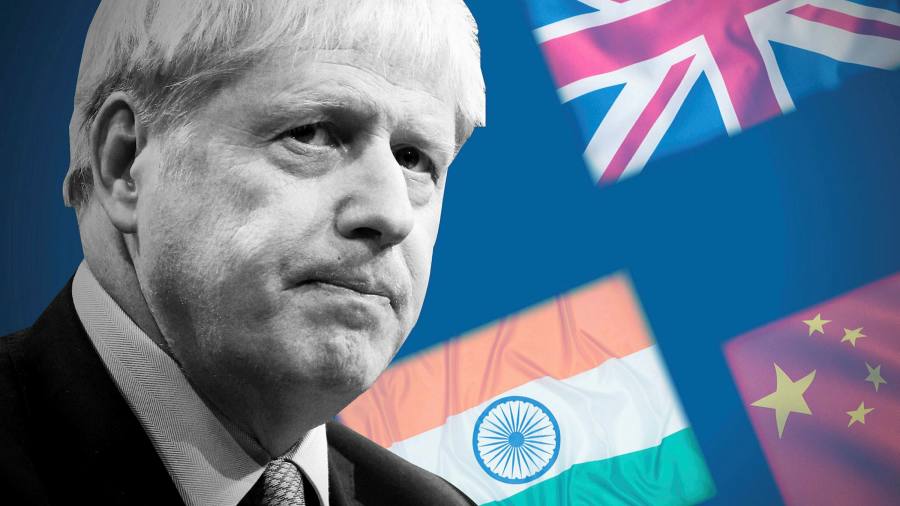[ad_1]
Boris Johnson is planning a spring trip to India as part of Britain’s new “Indo-Pacific tilt†strategy, in the first major bilateral visit by a UK prime minister since Theresa May toured Africa in 2018.
Johnson’s Indian visit will follow the launch next week of the government’s “integrated review†of foreign and defence policy, highlighting the economic opportunities of Asia and the potential strategic threat of China.
The fact that Johnson’s overseas trip is the first such tour by a British premier since May visited Kenya, Nigeria and South Africa in August 2018 shows the extent to which UK foreign policy has been paralysed, first by Brexit and then Covid-19.
Johnson will launch the 100-page integrated review on March 16, a document that will shape Britain’s post-Brexit foreign and defence policy.
Critics argue that Britain’s new focus on the Asia/Pacific region will not offset the economic and diplomatic damage caused by the UK leaving the EU, by far its biggest commercial partner.
Although the review will assert that Nato and the transatlantic relationship with Washington remains the bedrock of UK security, it will provide a shift of focus to Asia.
“The Indo-Pacific region is going to be the centre of the world in the next century in terms of growth and risk,†said one official briefed on the document. “The UK has a bit of catching up to do.â€
Ministers admit that the agonies of Brexit turned Britain in on itself, while the pandemic compounded that problem. Apart from attending international events and short visits to EU capitals, the premierships of May and Johnson involved few foreign diplomatic engagements.
The review will set out a “Global Britain†policy focused on structures such as Nato and the bilateral “E3†relationship where the UK, France and Germany have created a joint Iran policy outside of the EU framework.
But much of the focus will be on the Asian tilt, seen through the prism of Britain’s newly hawkish stance towards China: the UK is now more closely aligned with Washington than Paris and Berlin on its approach to Beijing.
“I think you can expect the UK to be more active and energetic — we have been talking about this Indo-Pacific tilt,†Dominic Raab, foreign secretary, said on a visit to New Delhi in December.
He said the UK had “shared interests and shared values†with many countries in the region, spanning areas such as maritime security, vulnerability of supply chains and climate change.
Johnson has invited three Indo-Pacific countries to attend the G7 summit in Cornwall in June as guests — Australia, India and South Korea — a move that has caused raised eyebrows among some of the other attendees.
“Some countries have questioned whether the G7 is the right forum to address China — this year is more about looking for re-engagement from the US,†said one G7 official, working on preparations for the summit.Â
Johnson, who will visit India before the Cornwall summit, has reassured G7 members that he is not attempting to turn the gathering of rich western economies into a permanent “Democratic 10†group. His India trip was planned for January but postponed because of Covid-19.
Both Johnson and Joe Biden, US president, want democratic countries to co-operate to counter the Chinese ascendancy in technology — particularly the role of Huawei in 5G. The UK also wants to lessen its dependence on Chinese nuclear technology.
“Technology is the linchpin between the prime minister’s Global Britain agenda and his ‘levelling up’ plans,†said another person briefed on the review document.
The global pandemic has reinforced the view in Downing Street that Britain needs to become more self-reliant in key sectors. Officials briefed on the review say that “technology†and “resilience†are frequently used words.
Britain’s intention to increase its presence in the Pacific was illustrated in January by its application to join 11 countries in the Comprehensive and Progressive Agreement for Trans-Pacific Partnership.
The UK is also sending its new aircraft carrier HMS Queen Elizabeth to East Asia this summer. While Johnson has only announced that the carrier will go as far as the Indian Ocean, the Queen Elizabeth is also expected to carry out freedom of navigation exercises in the disputed waters of the South China Sea, where Beijing’s navy and air force are increasingly active.
Downing Street said it was not seeking “at the moment†to join the so-called quad — the security alliance seeking to deter China’s adventurism in the Pacific — comprising the US, Australia, Japan and India.Â
[ad_2]
Source link





